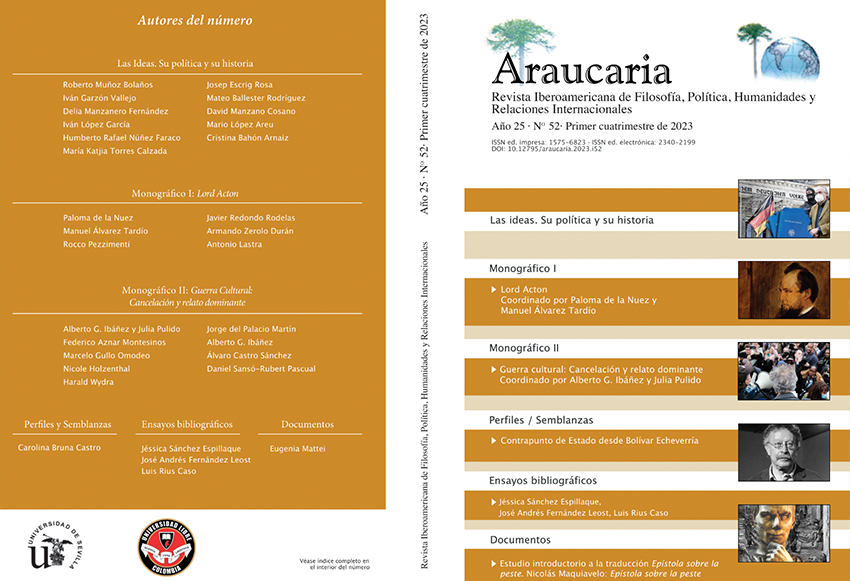“Shadow army” and military terrorism in 21st century Germany. The 2017 Der Tag X conspiracy
“Ejército en la sombra” y terrorismo militar en la Alemania del siglo XXI. La conspiración de Der Tag X de 2017
DOI:
https://doi.org/10.12795/araucaria.2023.i52.01Palabras clave:
Bundeswehr, Extrema derecha, Fuerzas Armadas, Intervencionismo militar, TerrorismoResumen
En 2017 se descubrió en el seno de la Bundeswehr (Fuerzas Armadas) de Alemania una conspiración conocida como Tag X (Día X). Esta operación se había articulado a partir del embrión de un posible “Ejército en la sombra”, apoyado por organizaciones paramilitares, y su objetivo era tomar el poder mediante el uso de la violencia y el terror Der Tag X (El Día X). Esta dinámica culminaría con la puesta en marcha de una “limpieza étnica”, la eliminación de los “enemigos internos” y el establecimiento de un Estado autoritario. La tesis que mantenemos es que el origen de esta conspiración militar está íntimamente asociada a un conjunto de transformaciones políticas, sociales, económicas y culturales que se han producido desde la última década del siglo XX y que han creado una situación favorable para el ascenso de la extrema derecha en Alemania y “legitimado” a militares de esta ideología para intervenir en el proceso de toma de decisiones políticas.
Descargas
Citas
Abenheim, Donald and Hartmann, Uwe, Tradition in der Bundeswehr. Zum Erbe
des deutschen Soldaten und zur Umsetzung des neuen Traditionserlasses
(Berlin: Miles, 2018).
Bald, Detlef, “Neotraditionalismus und Extremismus: Eine Gefährdung für die
Bundeswehr”. In Mutz, Reinhard; Schoch, Bruno and Solms, Friedhelm
(eds.): Friedensgutachten (277-288) (Münster: Lit Verlag, 1998).
Beck, Jürgen, Exodus Europa: Die Flüchtlingskrise 2015: Daten, Fakten,
Hintergründe (Altenmünster: Jazzybee Verlag, 2015).
Braunthal, Gerard, Right-Wing Extremism in Contemporary Germany (London:
Palgrave MacMillan 2009), 61.
Carsten, Francis L., The Reichswehr and politics: 1918 to 1933 (Berkeley:
University of California Press, 1973).
Corum, James (ed.), Rearming Germany, The Founding of the Bundeswehr
-1956 (Boston: Brill, 2011).
Dudek, Peter, Jugendliche Rechtsextremisten: Zwischen Hakenkreuz und
Odalsrune, 1945 bis heute (Cologne: Bund Verlag, 1985).
Finer, Samuel E., The Military in World Politics (Buenos Aires: Editorial
Sudamericana, 1969).
Flade, Florian, “The Insider Threat: Far-Right Extremism in the German
Military and Police”, CTCSentinel, 14, 5 (1-10) (2021).
Gareis, Sven Bernhard; Kozielski, Peter-Michael and Kratschmar, Michael,
Rechtsextreme Orientierungen in Deutschland und ihre Folgen für die
Bundeswehr (München: Sozialwissenschaftliches Institut der Bundeswehr,
.
Habermas, Jürgen, Ciudadanía e identidad nacional (Madrid: Tecnos, 1998).
Harries-Jenkins, Gwyn and Moskos, Charles, Las Fuerzas Armadas y sociedad
(Madrid: Alianza, 1984).
Havertz, Ralf, Radical Right Populism in Germany: AfD, Pegida, and the
Identitarian Movement (London: Routledge, 2021).
Heyl, Matthias, “Was ist und zu welchem Ende studiert man die Geschichte
des Holocaust? Aufarbeitung der Vergangenheit heute”. In Erler, Hans,
Erinnern und Verstehen (189-209) (Frankfurt / New York: Campus Verlag,
.
Huntington, Samuel P., Soldier and the State: The Theory and Politics of CivilMilitary Relations (Cambridge, Ma.: Harvard University Press, 1957).
Husbands, Christopher T., Reflections on the Extreme Right in Western Europe, 1990–2008 (London: Routledge, 2020).
Janowitz, Morris, El soldado profesional (Buenos Aires: Editorial Bibliográfica
Argentina, 1967).
Jaschke, Hans-Gerd, Rechtsextremismus und Fremdenfeindlichkeit: Begriffe,
Positionen, Praxisfelder (Düsseldorf: Springer-Verlag, 2001).
Kayss, Sarah Katharina, Identity, Motivation and Memory: The Role of History
in the British and German Forces (London: Routledge, 2018).
Knorr, Ludwig, Rechtsextremismus in der Bundeswehr: deutsches Militär von
Massenmördern geprägt? (Frankfurt: Westarp 1998).
Kohr, Heinz-Ulrich, Rechts zur Bundeswehr, links zum Zivildienst?
Orientierungsmuster von Heranwachsenden in den alten und neuen
Bundesländern (München: Sozialwissenschaftliches Institut der
Bundeswehr, 1993).
Kümmel, Gerhard and Spangenberg, Stefan, Gewalt, Gesellschaft und
Bundeswehr. Zur Wahrnehmung der Entwicklung eines gesellschaftlichen
Phänomens (München: Sozialwissenschaftliches Institut der Bundeswehr,
.
Laabs, Dirk, Staatsfeinde in Uniform: Wie militante Rechte unsere Institutionen
unterwandern (Berlin: Ullstein, 2021).
Meisner, Matthias and Kleffner, Heike (eds.), Extreme Sicherheit: Rechtsradikale
in Polizei, Verfassungsschutz, Bundeswehr und Justiz (Freiburg: Herder
Verlag, 2019).
Marche, Stephen, The Next Civil War: Dispatches from the American Future
(New York: Simon & Schuster, 2022).
Merckel, Angela, Podemos hacerlo (Barcelona: Plataforma Editorial, 2021).
Muñoz Bolaños, Roberto, “Are we so different? Military interventionism in Spain, the United Kingdom and the United States”, Araucaria. Revista
Iberoamericana de Filosofía, Política, Humanidades y Relaciones Internacionales, 47, 2 (431-456) (2021).
Schäfer, Paul, Bundeswehr und Rechtsextremismus. Erschienen. (Bonn: Wissenschaft und Frieden, 1998).
Schubarth, Wilfried and Stöss, Richard (eds), Rechtsextremismus in der Bundesrepublik Deutschland: Eine Bilanz (Opladen: Leske & Budrich, 2001).
Sternberger, Rolf, El patriotismo constitucional (Bogota: Universidad de Externado de Colombia; 2001).
Stöss, Richard, Vom Nationalismus zum Umweltschutz: Die Deutsche Gemeinschaft/Aktionsgemeinschaft Unabhängiger Deutscher im Parteisystem der Bundesrepublik (Opladen: Westdeutscher, 1980)
Vagts, Alfred, A History of Militarism: Civilian and Military (London, Hollis & Carter, 1958)
Von Der Behrens, Antonia, “Lessons from Germany`s NSU case”, Race &
Class, 59, 4 (84-91) (2018).
Walter, Barbara, How Civil Wars Start: And How to Stop Them (New York:
Penguin, 2022).
Wette, Wolfram, ”Militäreinsätze im Innern: Historische Erfahrungen und
aktuelle Entwicklungen”. In E. Frieden, Ernstfall (ed.), Lehren aus der
deutschen Geschichte seit 1914 (421-457) (Bremen: Donat, 2017) (421-
.
Wette, Wolfram (2019): “Rechtsextremismus in der Bundeswehr.
Militärhistorische Anmerkungen”, Historisches Seminar der
Albert-Ludwigs-Universität Freiburg i. Br. bei der 101. Tagung des
Darmstädter Signals, Forum kritischer Soldaten, 1-8 (2019) http://
upgr.bv-opfer-ns-militaerjustiz.de/uploads/Dateien/Stellungnahmen/
Wette20190520Eisenach-Rechtsextremismus-Bundeswehr.pdf
Descargas
Publicado
Cómo citar
Número
Sección
Licencia
Las ediciones impresa y electrónica de esta Revista son editadas por el Secretariado de Publicaciones de la Universidad de Sevilla, siendo necesario citar la procedencia en cualquier reproducción parcial o total.Salvo indicación contraria, todos los contenidos de la edición electrónica se distribuyen bajo una licencia de uso y distribución “Creative Commons Atribución-NoComercial-SinDerivar 4.0 Internacional”








